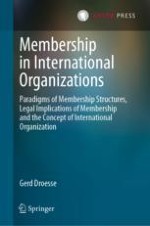2020 | OriginalPaper | Chapter
8. Membership and Privileges and Immunities
Author : Gerd Droesse
Published in: Membership in International Organizations
Publisher: T.M.C. Asser Press
Activate our intelligent search to find suitable subject content or patents.
Select sections of text to find matching patents with Artificial Intelligence. powered by
Select sections of text to find additional relevant content using AI-assisted search. powered by
